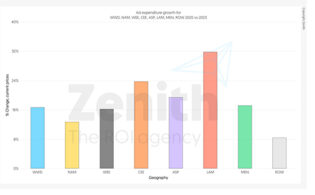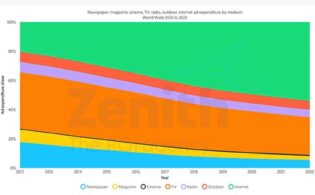NEW YORK: Global advertising spending will continue to increase at growth rates of between 4 percent and 5 percent through 2019, Zenith says in its new Advertising Expenditure Forecasts report out today.
This year, Zenith anticipates a 4.4 percent growth rate, down slightly on last year’s 4.6 percent rate. Next year is also expected to see a 4.4 percent increase, followed by 4.2 percent in 2019.
For the first time, internet advertising revenues globally will surpass television this year, reaching $205 billion as compared with television’s $192 billion. Television’s share is expected to be 32.6 percent in 2019, down from 35.5 percent last year. “One of the reasons for television’s loss of share is the rapid growth of paid search, which is essentially a direct response channel (together with classified), while television is the preeminent brand awareness channel,” Zenith said. “Television does not compete directly against search, and indeed the two can complement each other, for example by running paid search activity to take advantage of the increase in searches driven by a television campaign. Taking internet classified and search out of the picture, television will remain the principal display medium for many years to come. We estimate television accounted for 43.8 percent of display expenditure in 2016, and will attract 41.5 percent in 2019.”
The report continues, “If we consider audiovisual advertising as a whole—television plus online video—we see that it is, in fact, holding onto its dominant share of display advertising. Television offers unparalleled capacity to build reach, while online video offers pinpoint targeting and the potential for personalization of marketing messages. Both are powerful tools for establishing brand awareness and associations. We estimate that audiovisual advertising accounted for 48.9 percent of display advertising in 2016, up from 43.8 percent in 2010, and expect its share to reach 49.0 percent in 2019.”
In the last year, Western and Central European ad spend was up 4 percent. Zenith expects slower growth of 2.7 percent this year. While ad spend growth will be slow in the U.K., Portugal, Spain and Sweden are expected to see strong gains. Zenith expects Eastern Europe and Central Asia to be the fastest-growing regional bloc to 2019, with 8.9 percent annual growth in ad spend.
In Asia, Japan will be stuck at a growth rate of around 1.9 percent a year between 2016 and 2019. “Advanced Asia” encompassing Australia, New Zealand, Hong Kong, Singapore and South Korea was up just 1.4 percent in 2016. Zenith estimates a 2.8 percent increase yearly till 2019. China, India, Indonesia, Malaysia, Pakistan, Philippines, Taiwan, Thailand and Vietnam fall under “Fast-track Asia,” where ad revenues rose 9.3 percent last year. With a slowing Chinese economy, Zenith expects an 8.4 percent increase this year and an average of 7.9 percent a year between 2016 and 2019.
North America, boosted by the Olympics and the presidential election, rose 4.3 percent last year, with a projected 3.4 percent growth rate every year through 2019.
Latin America saw ad spend down 0.5 percent last year but Zenith expects a recovery to 2 percent annually for the next two years.
MENA is still suffering from the 2014 drop in oil prices and political turmoil. Zenith anticipates a 9 percent drop in ad spend in 2017, following the 10 percent decline in 2016. No recovery is predicted for the forecast period, with Zenith expecting ad spend to shrink 3.2 percent in 2018 and 1.1 percent in 2019.
Zenith also notes that ad growth is concentrated in big cities. Ten cities will contribute 11 percent of all the growth in global ad spend between 2016 and 2019: New York, London, Los Angeles, Jakarta, Tokyo, Shanghai, Manila, Beijing, Dallas and Houston.
“Population numbers, productivity and disposable incomes are rising faster in cities than elsewhere,” said Jonathan Barnard, head of forecasting at Zenith. “So city dwellers are becoming more valuable for advertisers seeking growth. Big cities are now driving growth in ad spend.”





